CHANGE YOUR MIND
South African psychiatrists gear up to treat depression with psychedelics
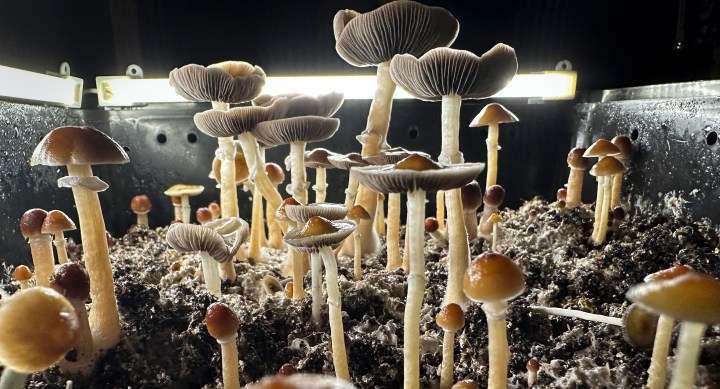
Drugs demonised by their recreational use in the 1960s are proving their worth in helping to improve people’s mental health. Soon they will be coming to a doctor’s practice near you.
As the medication kicked in, the mechanical bleep-bhup bleep-bhup bleep-bhup of the blood pressure monitor became transcendent melting through into the electronic drumbeats playing through Jane’s headphones (her name has been changed).
Eyes closed, window blinds drawn, the clinical setting dissolved. The hospital bed, the attending nurse, the anaesthetist overseeing the infusion that trickled the ketamine-saline solution into a vein, her own body – it all faded to the edge of awareness.
A panorama unfolded across a movie theatre in her mind. As if in a self-directed dream, she drifted in the amniotic waters of the Atlantic Ocean with her swimming companions.
Here, she found what she was aching for: a sense of connection – with herself, her friends, the other life forms in the kelp forest understorey. As she floated in an aquatic womb, the loneliness of the post-Covid world lost its sting. Life felt meaningful again.
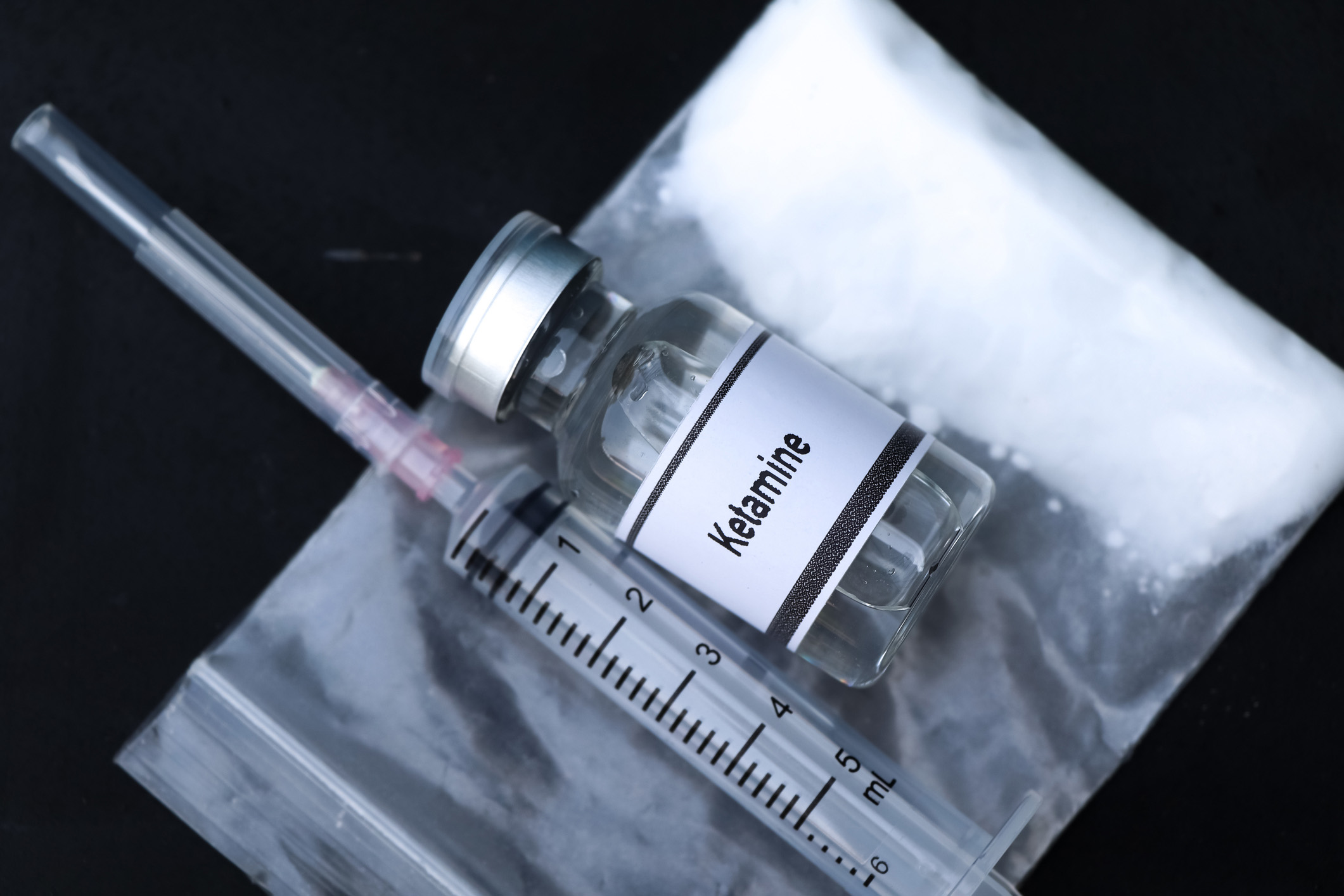
Ketamine, licensed as an anaesthetic, is being widely used off-label by psychiatrists in South Africa as a treatment for acute depression. (Photo: iStock)
Experiencing the numinous is typical with therapeutic doses of traditional psychedelic substances such as psilocybin, the naturally occurring psychedelic compound in hallucinogenic mushrooms, or DMT (N,N-dimethyltryptamine), found in ayahuasca.
Ketamine, a lab-produced drug, is similar, says clinical psychologist Jamie Elkon. Ketamine is a licensed and widely used anaesthetic, but psychiatrists can prescribe it off-label (which means it’s not licensed to treat depression, but regulations allow doctors to use it for this purpose) since it’s been found to be effective in treating acute depression and suicidal urges.
“People can have a transpersonal experience so they feel connected with something greater than themselves,” says Elkon, who is part of a team at a private Cape Town clinic offering psychedelic-assisted therapy using ketamine.
Jane (50) has managed low-grade chronic depression since her teens. But, like so many, the isolation and uncertainty of Covid quarantining pushed her into a fever that she couldn’t break.
The ketamine treatment was one of six staggered infusions during a three-week hospital stay. The experience was similar to a therapeutic mushroom trip, she says.
But, unlike psychedelic mushrooms, this trip was legal. The treatments were prescribed by her psychiatrist, administered by an anaesthetist, supported with talk therapy from her psychologist and paid for by her medical aid.
Psilocybin is coming
Australia made global headlines in July when it licensed psilocybin for medical use, allowing psychiatrists to prescribe it to treat depression. Britain and the US are expected to follow soon, a trend that is likely to go global.
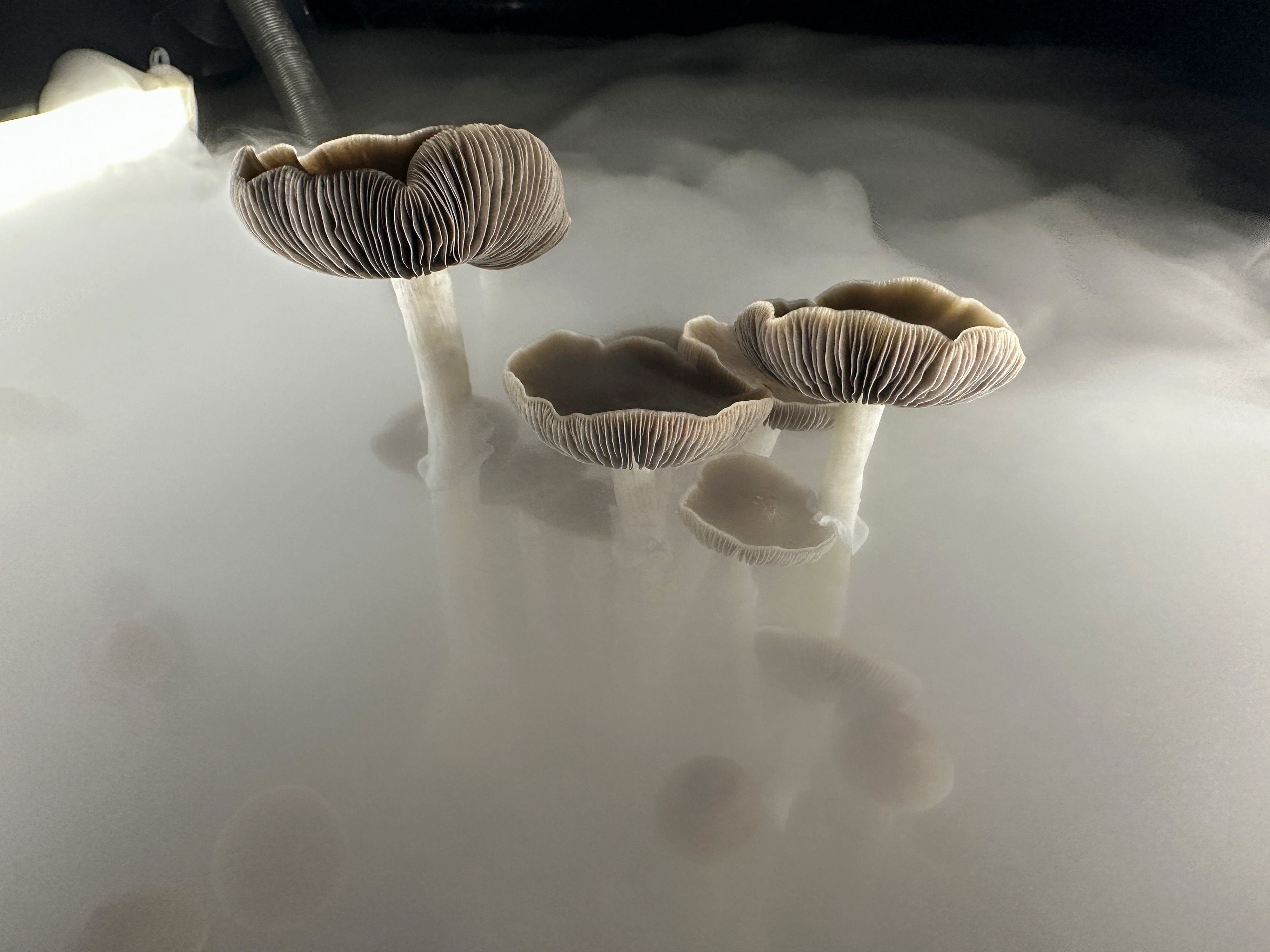
Psilocybin mushrooms stand ready for harvest in a humidified ‘fruiting chamber’ in a private home in the US. Recent studies suggest that the mushrooms show promise in combating a range of mental health problems. Scientists say psilocybin may promote neuroplasticity, a rewiring of the brain that gives patients fresh perspectives on long-standing difficulties. (Photo: John Moore / Getty Images)
The psychiatric world is revisiting psychedelic medicine for treating certain mental illnesses. This follows a half-century hiatus after the moral panic of the 1960s, when psychedelics became widely used in the recreational scene and were made illegal under the United Nations 1971 Convention on Psychotropic Substances.
Medical institutions, such as the Johns Hopkins Department of Psychiatry and Behavioral Sciences in the US and the Centre for Psychedelic Research at Imperial College London in the UK, have picked up on the large body of research that had accumulated by the 1950s that showed the potential of substances such as psilocybin and LSD to treat depression, end-of-life anxiety, trauma symptoms and substance dependency.
South Africa trails behind in its readiness for psilocybin and other psychedelic-supported therapies, including in its regulation, laboratory manufacturing capacity and practitioner readiness.
But a range of experts who spoke to Daily Maverick agreed that ketamine therapy can pave the way for other substances that work on the brain in a similar way.
“Psychedelics are entering the formalised sector of psychiatry treatment,” says Dr Suntheren Pillay, a Durban-based psychiatrist and member of the South African Society of Psychiatrists (Sasop). “It’s moving from fringe to mainstream. Australia was first, and other countries are following suit. We’re following the global trend.”
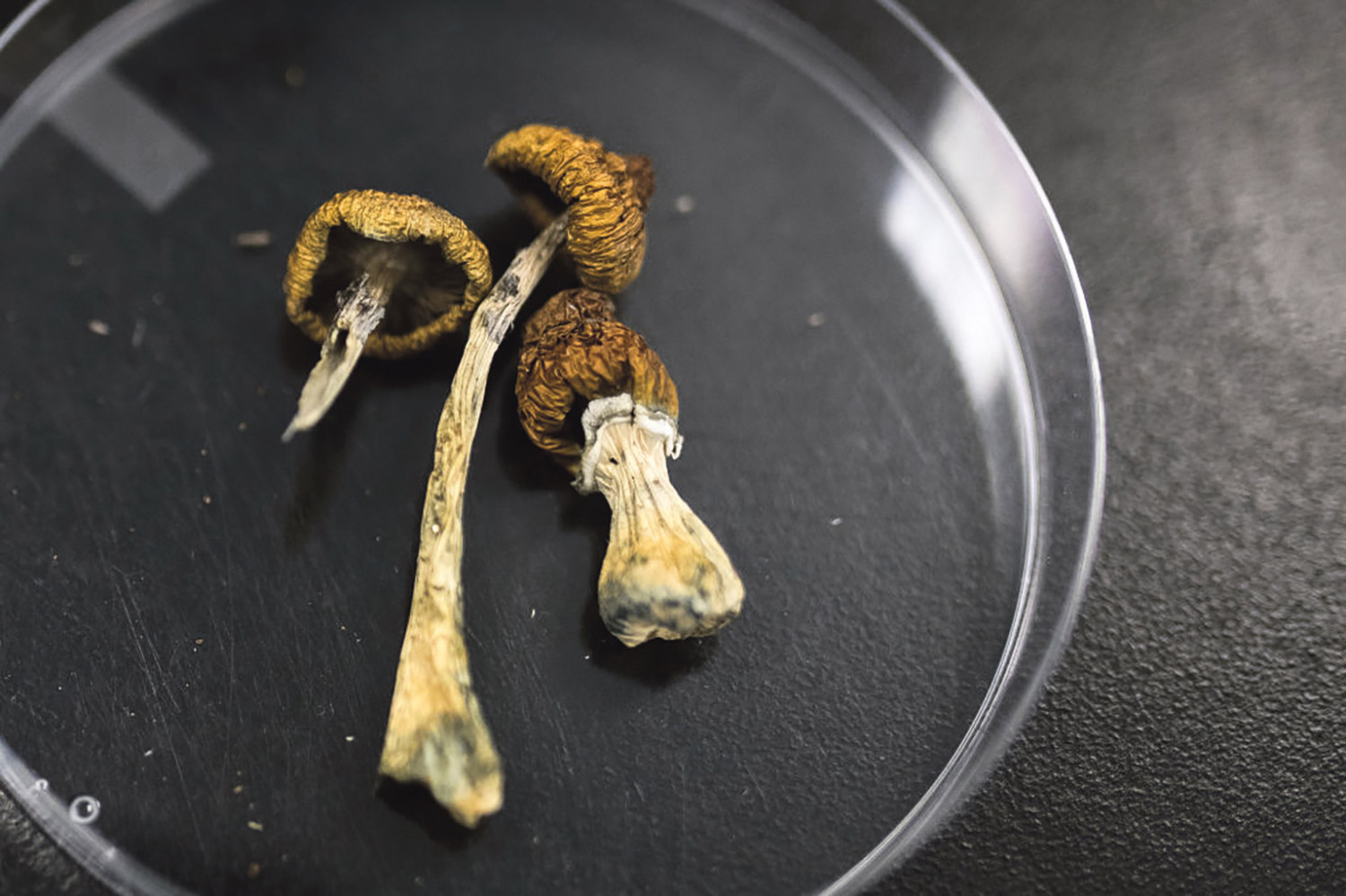
Psilocybin mushrooms at the Numinus Bioscience lab in Nanaimo, British Columbia, Canada. Numinus Wellness, a mental healthcare company specialising in psychedelic-assisted therapies, was the first public company in Canada to harvest the first legal batch of mushrooms from the Psilocybe genus. (Photo: James MacDonald / Bloomberg via Getty Images)
Psilocybin and ketamine have antidepressant effects in two ways. The patient has a deep subjective experience during the dosing session, described as a waking-dream state, in which they report having heightened sensory awareness, profound psychological insights and often a universal sense of connection.
At a biological level, these molecules tweak the brain in such a way that the benefits can last for weeks after a dosing session by easing the unhelpful thought patterns that often lock people into a depressive state.
Initial psilocybin trials from Imperial College and others show that many patients experience relief from their symptoms for up to three months after supervised dosing sessions.
Ketamine’s benefits wear off sooner than those of psilocybin, according to Elkon. People might start to feel the depression creeping back after a month, after which they may need another dosing session.
“Ketamine is good for crisis management. You might get a longer shelf-life with psilocybin,” he explains.
Psychedelic-assisted therapies aren’t a silver bullet, clinicians say, and need to be used among other tools to manage mental wellbeing, such as mindfulness, talk therapy, physical exercise, time in nature and other psychiatric medications where appropriate.
“It’s the intelligent stacking of these things that gets people well and leads to longer periods of mental wellness. It gives them more resilience for when the wheels come off,” Elkon says.
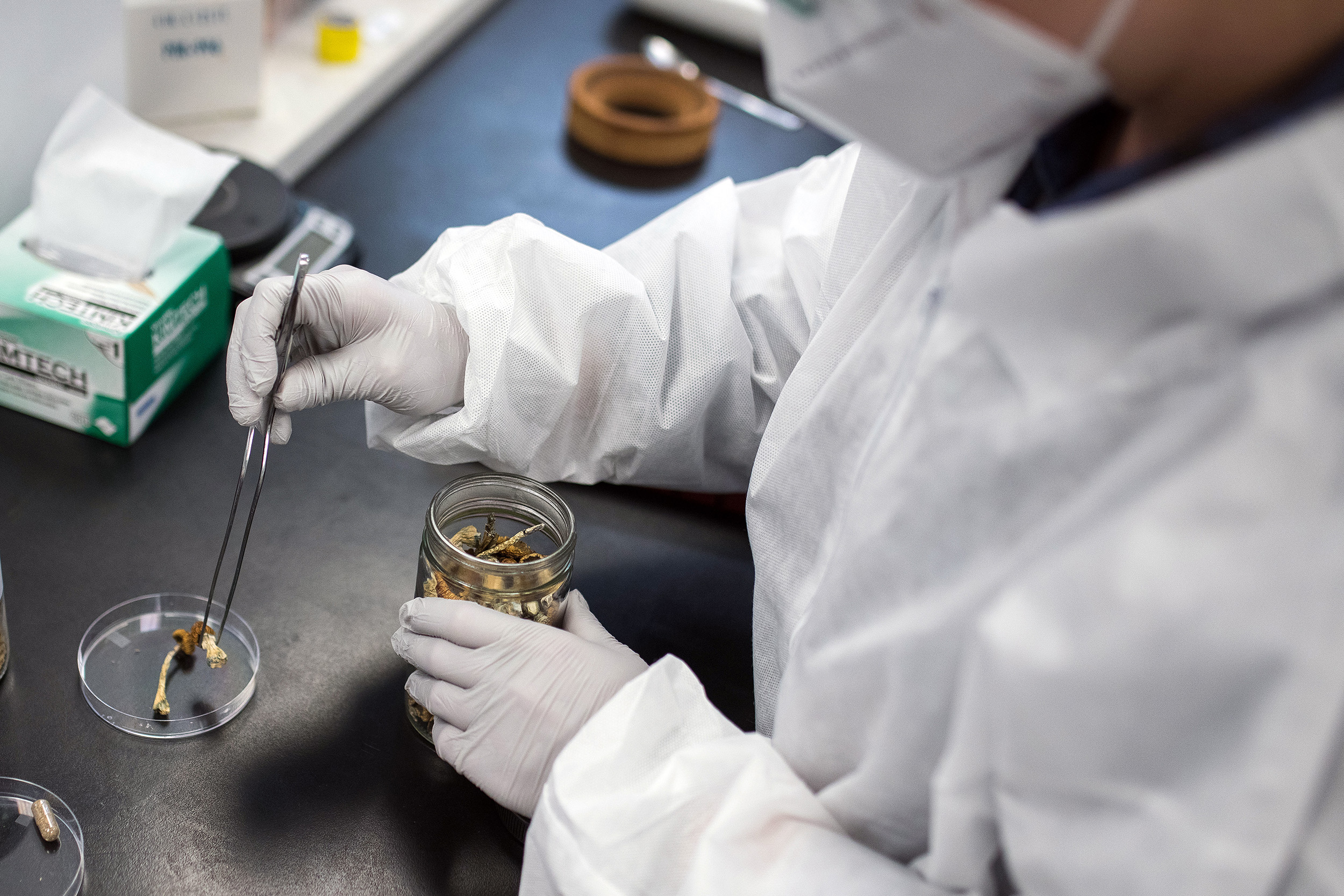
A researcher handles a psilocybin mushroom at Numinus Bioscience in 2021. The company, specialising in psychedelic-assisted therapies, was the first in Canada to harvest a legal batch. (Photo: James MacDonald / Bloomberg via Getty Images)
Jane’s ketamine treatment followed the established medical protocols: a harm-reduction screening with her doctor, to make sure she wasn’t showing symptoms of psychosis or schizophrenia (conditions that a psychedelic experience can make worse); the dosing sessions were supervised and in a safe, contained environment; and her psychologist later helped her mull over the insights she drew from the dreamlike state.
The “set and setting” – the safe, supportive environment – is central to psychedelic-assisted therapy. Psychedelic experiences can be psychologically intense and overwhelming at times, doctors say, which is why people are warned against self-medicating with higher doses.
A call from psychiatrists
South Africa’s psychiatry community is gearing up for the medicalisation of psychedelics such as psilocybin, as well as MDMA.
MDMA is an “empathogen”, known as ecstasy in the recreational drug scene, which was developed in a lab in 1912. It was used in couple counselling in the 1970s and early 1980s because of its effects of lowering anxiety, increasing open-heartedness and giving a sense of inner peace.
But its escape into the recreational scene saw it added to the UN convention’s list of illegal drugs in 1985.
Recent trials show MDMA to be effective for treating the symptoms of post-traumatic stress disorder (PTSD). Sasop is calling on the South African Health Products Regulatory Authority (Sahpra) to revisit the scheduling of psilocybin and MDMA to be in line with the emerging scientific evidence of the substances’ medical potential.
Psilocybin and MDMA are Schedule 7 drugs, meaning that Sahpra ranks them alongside substances such as heroin and crystal meth, which it regards as dangerous habit-forming drugs with no medical potential or scientific value.
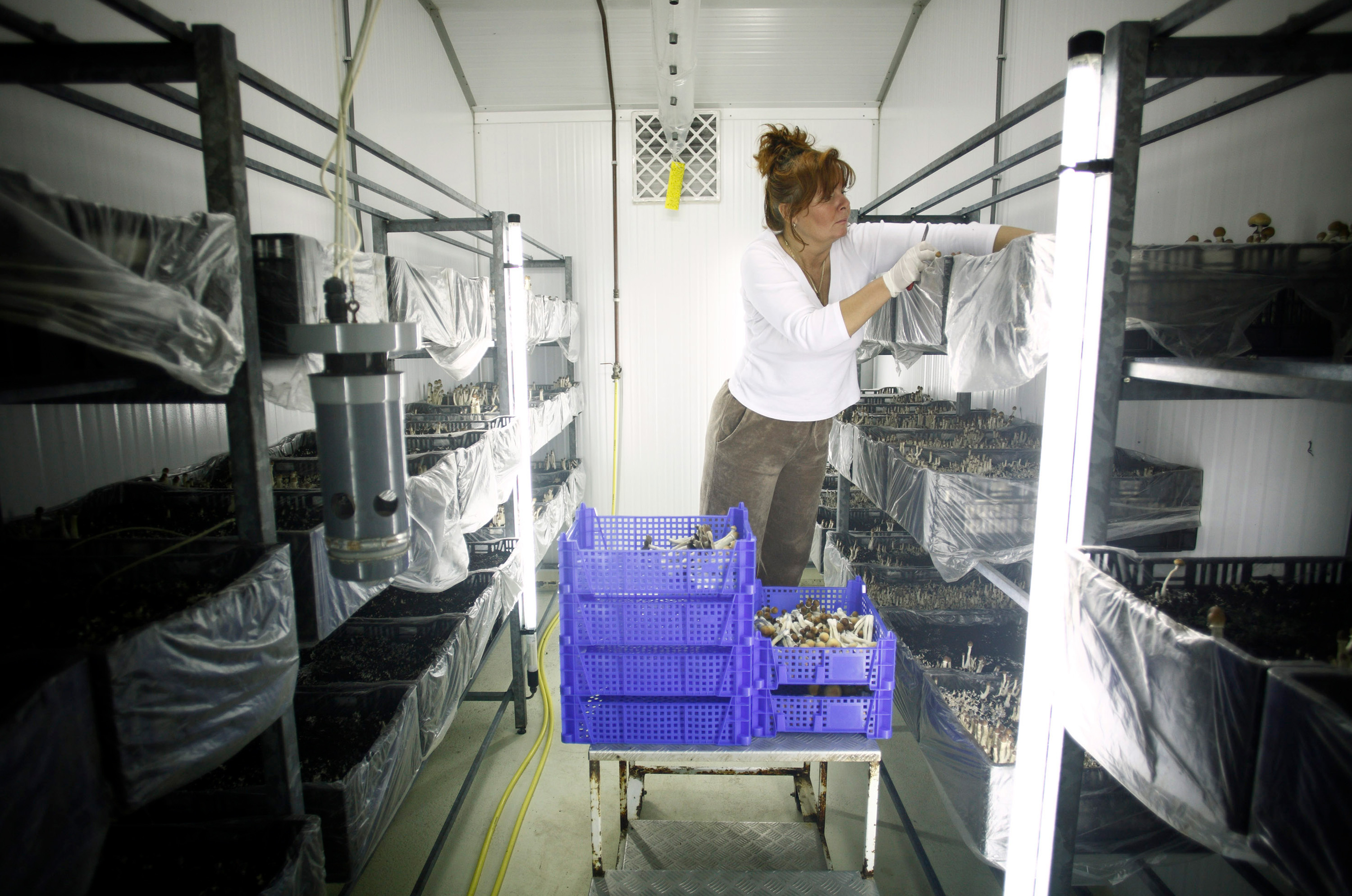
A worker harvests mushrooms at the Procare plantation in the Netherlands in 2007. (Photo: Roger Cremers / Bloomberg via Getty Images)
However, the emerging evidence in medical trials doesn’t support this evaluation, according to researchers in the field.
Sasop issued a position statement in 2022 calling on Sahpra to “re-evaluate or reassess the scheduling of [these] substances”, as required by the South African National Drug Master Plan, and remove the obstacles that make them unavailable for medical and scientific purposes.
This rescheduling should, nevertheless, continue to restrict the drugs’ availability for recreational use.
Pillay warns that although psychedelics are coming to the fore again, people must be cautious about their use. Recreational use in the 1960s provided grounds to make them illegal.
“We don’t want to have them taken away again because it forms a very important part of treatment,” he says. “In South Africa, we have thousands of people with treatment-resistant PTSD because of our violent past and the violent present that we live in, so we want to have the drug.”
First clinical trial
The Department of Psychiatry at Stellenbosch University is set to start South Africa’s first psilocybin clinical trial.
Professor Soraya Seedat, who heads the department, confirms that the university is partnering with the local branch of the international research institute TASK to run a double-blind phase-two trial that will test psilocybin to treat depression in HIV-positive women, who are vulnerable to mental health difficulties.
Once they have raised the funding, the trial will use supervised psilocybin dosing sessions with talk therapy by psychologists at TASK’s Cape Town-based facility. Seedat says the researchers will use lab-produced psilocybin imported from a US-based research institute.
Obtaining medical-quality laboratory-made psilocybin is one of the main bottlenecks to psilocybin research and medical use, according to drug policy expert Andy Gray of the pharmacology division at the University of KwaZulu-Natal’s Discipline of Pharmaceutical Sciences.
“Finding a suitable, quality-assured source will be challenging for any individual prescriber or clinical trialist,” says Gray. The medication will need to be locally registered, or imported from another jurisdiction that can vouch for its quality.
Pillay agrees. The main blockage isn’t rescheduling psilocybin, but getting local labs up and running once the drug is medicalised.
“If Sahpra legalises these substances [psilocybin and MDMA], the labs will start producing it. If we’re producing it for research, we can produce it for public consumption.”
Tripping away the blues
In the meantime, ketamine treatment is gaining momentum in South Africa, with a growing number of clinicians offering it. Sasop recognises its effectiveness, but is calling for tighter guidelines on how clinicians should use it.
Jane sees ketamine as a maintenance option in the ebb and flow of her mental health. If she needs to, she can pop into the clinic as an outpatient for an occasional intramuscular top-up of the drug. This is supervised by a nurse and is more affordable than the anaesthetist-administered infusion.
Six months after her hospital stay, she’s found equilibrium again. With other medications and regular talk therapy, the ketamine treatments helped bring down her fever of depression. They allowed her to return to the daily lifestyle tweaks that usually keep her melancholy at bay.
She can pull on her running shoes again and get out on the mountain trails, she can connect with friends, and her mind is clear enough to focus on work once more, all of which give a sense of stability. DM
Part 2 of this story, which looks at the decriminalisation of psilocybin, will be published next week.
This story first appeared in our weekly Daily Maverick 168 newspaper, which is available countrywide for R29.





















Comments - Please login in order to comment.